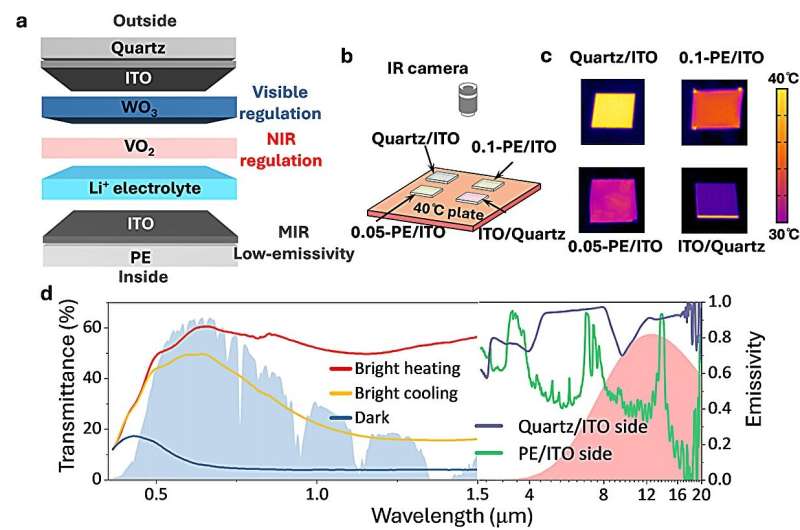New electrochromic structure with tri-band optimization developed for energy-saving smart windows in buildings
A research team led by Prof. Cao Xun from the Shanghai Institute of Ceramics of the Chinese Academy of Sciences, together with collaborators from Huazhong University of Science and Technology, has developed a new type of electrochromic (EC) structure for energy-saving windows. The study is published in Nature Sustainability.
Electrochromic smart windows, which can dynamically regulate solar radiation under external voltage stimuli, have been considered as a promising technology to reduce the energy consumption of buildings.
To promote the application of EC windows, Cao’s group has made great efforts to improve EC performance, such as response speed, contrast ratio. However, little progress has been made in reducing the influence of solar radiation and outdoor temperature.
In this study, the researchers designed a new electrochromic smart window system based on a VO2-WO3 tandem film via a solid electrolyte with the tri-stable control of solar heat and sunlight transmittance simultaneously, with great energy-saving effect.
This structure allows Li+ to diffuse along the depth of VO2 and WO3, which could independently regulate the near-infrared (NIR) and visible transmittance of sunlight. The main advantage of VO2 is that the barrier for maintaining the state is decoupled from the barrier for changing the state, thus maintaining non-volatility compared to WO3.
With the above design feature, the EC-based windows can minimize the total energy cost of indoor lighting and heat exchange, which is the ideal drive for smart window design. Simulations show that this new ECD exhibits higher heating and cooling energy savings than a commercial low-E glass in most climates around the world.
In addition, outdoor experiments were conducted in Sanya, Hainan Province and Shanghai, achieving continuous cooling of up to 2°C–14°C throughout the day on a typical clear sunny day.
More information:
Zewei Shao et al, Tri-band electrochromic smart window for energy savings in buildings, Nature Sustainability (2024). DOI: 10.1038/s41893-024-01349-z
Chinese Academy of Sciences
Citation:
New electrochromic structure with tri-band optimization developed for energy-saving smart windows in buildings (2024, May 21)
retrieved 22 May 2024
from https://techxplore.com/news/2024-05-electrochromic-tri-band-optimization-energy.html
This document is subject to copyright. Apart from any fair dealing for the purpose of private study or research, no
part may be reproduced without the written permission. The content is provided for information purposes only.

Comments are closed